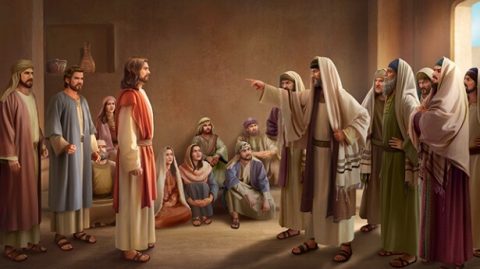2. Why some who have forsaken everything and expended for God become service-doers
Relevant Words of God:
For some people, no matter what issue they might encounter when performing their duties, they do not seek the truth, and they always act according to their own thoughts, notions, imaginings, and desires. They are constantly satisfying their own selfish desires, and their corrupt dispositions are always in control over their actions. Though they may complete the duties to which they have been assigned, they do not gain any truth. So, what are such people relying on when performing their duties? They are relying neither on the truth nor on God. That bit of truth that they do understand has not taken up sovereignty in their hearts; they are relying on their own gifts and abilities, on whatever knowledge that they have acquired, and on their talents, as well as on their own willpower or good intentions, to complete these duties. Is this doing their duty well? Is this doing their duty satisfactorily? Though you may sometimes rely on your naturalness, imagination, notions, knowledge, and learning to fulfill your duty, no issues of principle emerge in some of the things you do. On the surface, it looks as though you have not taken the wrong path, but there is one thing that cannot be overlooked: During the process of performing your duty, if your notions, imaginings, and personal desires never change and are never replaced with the truth, and if your actions and deeds are never done in accordance with the truth principle, then what will the final outcome be? You will become a service-doer. This is precisely what was written in the Bible: “Many will say to Me in that day, Lord, Lord, have we not prophesied in Your name? And in Your name have cast out devils? And in Your name done many wonderful works? And then will I profess to them, I never knew you: depart from Me, you that work iniquity” (Mat 7:22–23). Why does God call these people who exert effort and who render service, “you that work iniquity”? There is one point we can be sure on, and that is that no matter what duties or work these people do, their motivations, impetus, intentions, and thoughts arise entirely from their selfish desires, are totally based on their own ideas and personal interests, and their considerations and plans completely revolve around their reputation, status, vanity, and future prospects. Deep down, they possess no truth, nor do they act in accordance with the truth principle. Thus, what is crucial for you to seek now? (We should seek the truth, and perform our duties in accordance with God’s will and requirements.) What specifically should you do when performing your duties in accordance with God’s requirements? With regard to your intentions and ideas when doing something, you must learn how to discern whether or not they accord with the truth, as well as whether your intentions and ideas are geared toward fulfilling your own selfish desires or the interests of God’s house. If your intentions and ideas accord with the truth, then you can do your duty in line with your thinking; however, if they do not accord with the truth, then you must quickly turn around and abandon that path. That path is not right, and you cannot practice that way; if you continue to walk that path, then you will end up committing evil.
—“How to Experience God’s Words in One’s Duties” in Records of Talks of Christ of the Last Days
Whatever sort of talents, gifts, or skills one has, if they simply take action and exert themselves in performing their duty, and, no matter what they do, rely on their imaginings or notions, or on their own instincts as they exert themselves, and never seek the will of God, and there is not any concept or need in their heart that says, “I must put the truth into practice. I am performing my duty”; and their sole impetus is to do their job well and complete their tasks, then are they not someone who lives entirely by their gifts, talents, abilities, and skills? Are there many such people? In faith, they think only of exerting themselves, selling their own labor, and selling their own skills. Particularly when God’s house gives people general work to do, most will take such a point of view in doing it. All they do is exert themselves. Sometimes that means using their mouth to speak a bit; sometimes it means using their hands and physical strength; and sometimes it means using their legs to run about. Why is it said that relying on those things to live is using one’s strength, rather than putting the truth into practice? When someone has accepted a task given to them by God’s house, they think only of how to complete it as soon as possible, so that they can give an account to their leaders and gain their praise. They might lay out a step-by-step plan, and they may appear quite earnest, but they focus only on completing the task so that others may see, or when they are doing it, they set their own standards to judge their performance, based on how they can act such that they might arrive at happiness and contentment, and achieve the level of perfection they strive for. No matter what standards they set for themselves, if they are unconnected to the truth, and they do not seek the truth, or to understand and confirm what God asks of them before taking action, instead acting blindly, in bewilderment, then what they are doing is mere exertion. They are acting according to their own wishes, by dint of their own mind or their gifts, or on strength of their own abilities or skills. What is the consequence of acting this way? The task may have been accomplished, and perhaps no one found fault with it, and you may feel very pleased—but, in the course of doing it, firstly, you did not understand God’s will, and secondly, you did not act with all your heart, all your mind, and all your strength—you did not put your whole heart into it. If you had sought the truth principles and sought the will of God, then you would have accomplished nine-tenths of the task, and you would also have been able to enter into the truth reality and to understand correctly that what you were doing was in accord with God’s will. If you acted carelessly and haphazardly, however, though the task was done, you would not know in your heart how well it was done. You would have no benchmark, and you would not know whether it accorded with God’s will or with the truth. Therefore, to describe any performance of duty in such a state, two words will suffice—exerting yourself.
—“Exactly What People Have Been Relying on to Live” in Records of Talks of Christ of the Last Days
Of all the things I mentioned previously—putting all your heart, mind, soul, and strength into loving God—you only put forth your strength; you have not yet succeeded in applying all your heart, mind, and soul. You have not achieved these three aspects. You only know to put your strength into your duty. What sort of person are you in God’s eyes? (A service-doer.) Do you wish to be a service-doer? You have no wish to be a service-doer, and yet you are rendering service—and what is more, you take delight in it and never get tired of it. This is the sort of path you are on. You do not wish to be a service-doer, yet you actively render service—is this not a contradiction? Why has this come about? It is due to the sort of path you are on, which determines what goal you will ultimately reach. In colloquial terms, this means that “you reap what you sow.” The path you walk is that of a service-doer, and the path you have chosen is that of a service-doer, so this means you will end up rendering service. Because you always concern yourself with putting forth strength, and are not willing to expend any energy or spare any thought, do not want to put your heart, mind, and soul into loving God who is your Lord, the result you attain in the end can only be that you put your strength to use; as a result, you end up rendering service. There is no contradiction here. What is the contradiction? It is that people do not wish to be service-doers, and when they hear someone label them thusly, they become unhappy. They think, “Isn’t that slander against me? Doesn’t that underestimate me? It shows a bias toward others, doesn’t it? I’ve devoted so much of my effort and strength. How can I be a service-doer?” You are correct; you have exerted that much strength—and that makes you pure service-doer. You must think about how to not merely exert strength, but to also put your entire heart into it. Reach for this as a standard. Love the Lord your God with all your heart, mind, and soul. What should you use them toward? You should devote all your heart, mind, and soul toward doing your duty well, and in this way, you will become a good person in God’s eyes.
—“Having a Human Likeness Requires Fulfilling Your Duty Properly With All Your Heart, Mind, and Soul” in Records of Talks of Christ of the Last Days
When you complete a task or perform a duty, to speak of the thing itself, how is it done in a way that is practicing the truth, and how is it done in a way that is not practicing the truth? Not practicing the truth bears no relation to the truth. You may be performing your duty, but it has little to do with the truth; it is only a kind of good behavior, and can also be said to be a good deed, but there is still some distance between this and practicing the truth. They are different. So, on what basis can they be differentiated? When you are doing this thing, you maintain a certain scope and certain rules. One of these is that you do not cause losses to the interests of God’s house; another is that you rush around a bit more, and that you suffer a bit, failing to eat and sleep at a regular time. You have accomplished all these things, and, if no strict criteria are applied to you, your duty may yet be done satisfactorily. However, there is another thing: Have you unearthed and discovered which corrupt dispositions are within you when you do this thing? That is, have you unearthed and discovered what ideas you have and what things there are within you with which God is unsatisfied when you encounter this issue? Through performing this duty and doing this thing, do you come to a new understanding of yourself, and have you found any truth that you should put into practice and enter? (That seldom happens. Sometimes, I merely come to a superficial understanding of my arrogance, and then I take it no further.) Then the majority of the time you have a formulaic and theoretical understanding, no real understanding. If you do not pursue the truth, then, even if you have not done anything terribly wrong or wicked, and you have not violated the main principles, and externally, you seem like a good person with some humanity, you are still not practicing the truth, nor have you gained any truth. Your “not having done anything wrong” and appearing on the outside to be someone with humanity do not amount to being in accordance with the truth or practicing the truth. There is a gap, a difference, between this and practicing the truth. Therefore, many people believe in God, and after a period of time they find that they have become people who just exert effort. When they first started, they did not plan on believing this way, so how did they become someone who just does things through physical exertion? What is the implied meaning of “doing things through physical exertion”? It means to render service, to have become a tool. Why have you become people who render service? Do you wish to render service in this way? When you started to believe, you did not plan on rendering service; your plan was: “I must believe in earnest, I must understand the truth, and, in the end, I must rise up to heaven. At the very least I must not die.” And, after believing for a while, you then thought, “I must fear God and shun evil, and I must obey God.” But how have you unknowingly become people who exert themselves? It is because you can never enter into the truth in the environments God arranges for you or during the performing of your duties, and you are always using your physical exertions as a substitute for doing your duty—that is the reason.
—“What Is Practicing the Truth?” in Records of Talks of Christ of the Last Days
When man measures others, he does so according to their contribution. When God measures man, He does so according to man’s nature. Among those who seek life, Paul was someone who did not know his own substance. He was by no means humble or obedient, nor did he know his essence, which was in opposition to God. And so, he was someone who had not undergone detailed experiences, and was someone who did not put the truth into practice. Peter was different. He knew his imperfections, weaknesses, and his corrupt disposition as a creature of God, and so he had a path of practice through which to change his disposition; he was not one of those who only had doctrine but possessed no reality. Those who change are new people who have been saved, they are those who are qualified in pursuing the truth. People who do not change belong to those who are naturally obsolete; they are those who have not been saved, that is, those who are detested and rejected by God. They will not be remembered by God no matter how great their work. When you compare this with your own pursuit, whether you are ultimately the same kind of person as Peter or Paul should be self-evident. If there is still no truth in what you seek, and if even today you are still as arrogant and insolent as Paul, and are still as glib and boastful as him, then you are without doubt a degenerate who fails. If you seek the same as Peter, if you seek practices and true changes, and are not arrogant or willful, but seek to perform your duty, then you will be a creature of God who can achieve victory. Paul did not know his own essence or corruption, much less did he know his own disobedience. He never mentioned his despicable defiance of Christ, nor was he overly regretful. He only offered a brief explanation and, deep down in his heart, he did not completely submit to God. Though he fell on the road to Damascus, he did not look deep within himself. He was content merely to keep working, and he did not consider knowing himself and changing his old disposition to be the most crucial of issues. He was satisfied with merely speaking the truth, with providing to others as a salve for his own conscience, and with no longer persecuting Jesus’ disciples to console himself and forgive himself for his past sins. The goal that he pursued was nothing more than a future crown and transitory work, the goal he pursued was abundant grace. He did not seek sufficient truth, nor did he seek to progress deeper into the truth which he had previously not understood. His knowledge of himself can therefore be said to be false, and he did not accept chastisement or judgment. That he was able to work does not mean he possessed a knowledge of his own nature or essence; his focus was on outward practices only. What he strived for, moreover, was not change, but knowledge. His work was completely the result of the appearance of Jesus on the road to Damascus. It was not something he had resolved to do originally, nor was it work that occurred after he had accepted the pruning of his old disposition. No matter how he worked, his old disposition did not change, and so his work did not atone for his past sins but merely played a certain role among the churches of the time. For someone such as this, whose old disposition did not change—that is to say, who did not gain salvation, and was even more without the truth—he was absolutely incapable of becoming one of those accepted by the Lord Jesus.
—The Word, Vol. 1. The Appearance and Work of God. Success or Failure Depends on the Path That Man Walks




